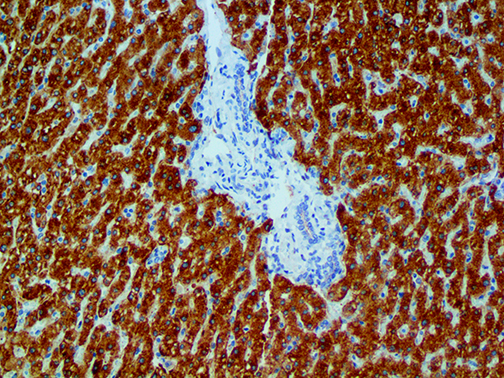
IHC of COX-2 on an FFPE Liver Tissue
| Intended Use | For In Vitro Diagnostic Use | |||||||||||||||||||||||||||||||||||
| Summary and Explanation | Prostaglandin-endoperoxide synthase 2 (prostaglandin G/H synthase and cyclooxygenase), also known as cyclooxygenase-2 or COX-2, is an enzyme that in humans is encoded by the PTGS2 gene and it is involved in the conversion of arachidonic acid to prostaglandin H2, an important precursor of prostacyclin and thromboxane A2, among others. Pharmacological inhibition of COX can provide relief from the symptoms of inflammation and pain; this is the method of action of well-known drugs such as aspirin and ibuprofen. COX-2 inhibition by nonsteroidal anti-inflammatory agents has been shown to decrease angiogenesis and tumor growth, and promote apoptosis. The expression of COX-2 is upregulated in many cancers. COX-2 overexpression has been associated with increased microvascular density, and VEGF protein expression in head and neck Squamous Cell Carcinomas and is a poor prognostic indicator in this entity as well. The overexpression of COX-2 along with increased angiogenesis and GLUT-1 expression is significantly associated with gallbladder carcinomas. Furthermore the product of COX-2, PGH2 is converted by prostaglandin E2 synthase into PGE2, which in turn can stimulate cancer progression. Consequently inhibiting COX-2 may have benefit in the prevention and treatment of these types of cancer. The mutant allele PTGS2 5939C carriers among the Han Chinese population have been shown to have a higher risk of gastric cancer. In addition, a connection was found between Helicobacter pylori infection and the presence of the 5939C allele. COX-2 overexpression has also been suggested as a poor prognostic indicator in Carcinomas of the Colon, Breast, Pancreas, and Adenocarcinomas of the Lung. | |||||||||||||||||||||||||||||||||||
| Antibody Type | Rabbit Monoclonal | Clone | EP293 | |||||||||||||||||||||||||||||||||
| Isotype | IgG | Reactivity | Paraffin, Frozen | |||||||||||||||||||||||||||||||||
| Localization | Cytoplasmic | Control | Colon, Stomach, Pancreas, Breast, Lung, Adenocarcinoma of Colon | |||||||||||||||||||||||||||||||||
| Presentation | COX-2 is a rabbit monoclonal antibody derived from cell culture supernatant that is concentrated, dialyzed, filter sterilized and diluted in buffer pH 7.5, containing BSA and sodium azide as a preservative. | |||||||||||||||||||||||||||||||||||
| Availability |
| |||||||||||||||||||||||||||||||||||
| Note: For concentrated antibodies, please centrifuge prior to use to ensure recovery of all product. | ||||||||||||||||||||||||||||||||||||



